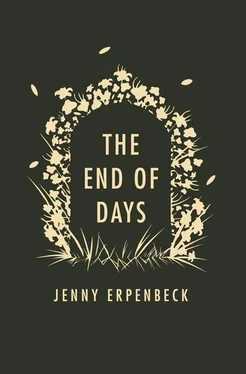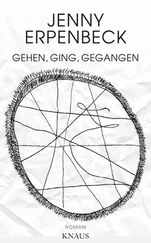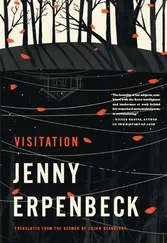Jenny Erpenbeck - The End of Days
Здесь есть возможность читать онлайн «Jenny Erpenbeck - The End of Days» весь текст электронной книги совершенно бесплатно (целиком полную версию без сокращений). В некоторых случаях можно слушать аудио, скачать через торрент в формате fb2 и присутствует краткое содержание. Год выпуска: 2014, Издательство: New Directions Publishing, Жанр: Современная проза, на английском языке. Описание произведения, (предисловие) а так же отзывы посетителей доступны на портале библиотеки ЛибКат.
- Название:The End of Days
- Автор:
- Издательство:New Directions Publishing
- Жанр:
- Год:2014
- ISBN:нет данных
- Рейтинг книги:4 / 5. Голосов: 1
-
Избранное:Добавить в избранное
- Отзывы:
-
Ваша оценка:
- 80
- 1
- 2
- 3
- 4
- 5
The End of Days: краткое содержание, описание и аннотация
Предлагаем к чтению аннотацию, описание, краткое содержание или предисловие (зависит от того, что написал сам автор книги «The End of Days»). Если вы не нашли необходимую информацию о книге — напишите в комментариях, мы постараемся отыскать её.
The End of Days — читать онлайн бесплатно полную книгу (весь текст) целиком
Ниже представлен текст книги, разбитый по страницам. Система сохранения места последней прочитанной страницы, позволяет с удобством читать онлайн бесплатно книгу «The End of Days», без необходимости каждый раз заново искать на чём Вы остановились. Поставьте закладку, и сможете в любой момент перейти на страницу, на которой закончили чтение.
Интервал:
Закладка:
Yet again, the suitcase and coal sack with the clock wrapped in its pillowcase are transported by the woman through the streets of Vienna, for a new official directive has ordered her to move from Dampfschiffstrasse to Obere Donaustrasse, and three months later from Obere Donaustrasse to Hammer-Purgstall-Gasse 3/12. Although the woman finds these moves quite burdensome, she nonetheless lugs the Complete Works of Goethe along with her, as well as the clock, these last two remaining possessions of her mother, who has long since been deported. And when she arrives at one or the other location, she unwraps the clock, winds it, then lays the key beside it, just as her mother always used to. Perhaps there’s secretly something magical about these inherited belongings, just like in the fairy tale, where, in time of need, a comb thrown over your shoulder can grow into a forest.
But no forest has grown as of August 13, 1942, when she boards the train at the Aspang Station in Vienna that will take her to Minsk. Forcing the doors, clearing out the shared apartment that served as a transit station for Jews at Hammer-Purgstall-Gasse 3/12, and making an inventory takes the Gestapo’s Division for the Processing of Jewish Personal Effects two and a half days. The clock has meanwhile come to a stop. The key for winding it lies, as always, beside it. Chaim Safir sticks the key through the little oval opening, through which you can see the pendulum, and into the clock case, then he puts the clock in a laundry basket, in which a stack of plates, a vase made of porcelain, several glasses and a crystal carafe are already awaiting deportation. To keep things from breaking, Chaim Safir stuffs some items of clothing between them, then he picks up the basket, carries it downstairs, and says to Herr Gschwandtner: All that’s left now is the furniture. Herr Gschwandtner follows him to do a check, looking around the room, he opens the cabinet doors, looks under the beds, pushes a little footstool aside, deftly pulling the suitcase out from behind it, saying: It’s probably full of jewels, you idiot. Chaim Safir says: I’m sorry, I overlooked the suitcase. Herr Gschwandtner says, The thing weighs a ton. At first the lid refuses to open, but then it does, such a mazl , Herr Gschwandtner says to Chaim Safir, nothing but books, just look what’s on the back of them: nothing but Goethe; he slams the suitcase shut again. To be or not to be , he says, grinning, as he gets to his feet. Chaim Safir nods without meeting Herr Gschwandtner’s eyes. Herr Gschwandtner pokes at the suitcase with his shoe-tip and says: This one goes downstairs too.
Suitcase and clock spend the weekend in the depot along with all the other items. On Monday morning the assessor comes and sorts the new arrivals according to value: the basket with the clock, carafe, and dishes is sent to Krummbaumgasse, ground floor, for private sale; since the suitcase looks so shabby, he doesn’t even open it before saying: That too. On the ground floor of Krummbaumgasse, shabby suitcases like this one — packed and then abandoned — sell for 2 reichsmark a piece (a pig in a poke, you take your chances, part and parcel, lock, stock, and barrel, blind man’s bluff, who doesn’t like a surprise), each is sold along with its contents, but opening the lid beforehand is not allowed. The newspaper prints a notice announcing the arrival of a new assortment of furniture and accessories for sale; a young wartime bride applies for an invitation to view the goods, enclosing her pay slip, she’s certainly poor enough and has a husband on the Eastern front, making ends meet isn’t easy for her. If she receives an invitation, she’ll be allowed to bring two friends or relatives when she comes, and she does receive one, so she brings her mother and a girlfriend — oh just look at that, isn’t that adorable, and really it’s not expensive. A vase, a carafe made of crystal, a set of sheets, or a plate. Just look at the clock, you can see its pendulum through the hole, maybe it doesn’t work, oh I’m sure it does, what’s that rattling around inside? look, the key, I’ll fish it out, careful, let’s wind it up, my goodness, look at the size of this platter, why are you surprised? they’re the ones who carve up babies, what nonsense, it’s really beautiful, and I’m going to take this suitcase, it’s such a good deal, go ahead, who knows what’s inside, Jesus it’s heavy, maybe stones, maybe treasure, could I possibly have just a tiny peek inside first? Madame, a peek would cost more, all right, if you insist, how bad can it be, I’ll take it as is, maybe it’ll be the surprise of my life, but let’s not open it till we get home, why not? I want to see what’s inside, why do you always have to be so impatient. The clock strikes three, even though it’s only just after nine-thirty. What a pretty chime, I wouldn’t like it myself, it sounds annoying, not to me, I’ll fix it to show the right time, I think it’s pretty, so do I, what do you want with a clock? everyone needs a clock. And I’ll take the platter. The Jewish platter? Why not? I’ll baptize it this Saturday: I’m making ham hocks.
Two years later when the war finally comes to an end, the wartime bride has a daughter, but her husband fell in Russia. The miniature grandfather clock strikes with tinny strokes all the hours that a life contains in peacetime, it strikes from one to twelve, one to twelve, and the next day the same thing, twice from one to twelve, it strikes at the crack of dawn when the janitor’s broom bumps against the front door from the outside, it strikes in the empty apartment all morning long while the girl is at school and the woman is at her office, strikes in the afternoon during the hour for coffee and cake, and in the evening during the lullaby The moon is arisen , it even strikes late at night when the war widow lets down her hair without a man to hang his belt over the back of the chair. It strikes from one to twelve for all the length of a peaceful Aryan life.
When the war widow approaches her fiftieth birthday, her elderly mother dies, and she dissolves her mother’s household with her daughter, who is meanwhile grown; in the basement, she finds the old Goethe edition: the surprise of her life back then, the pig in the poke; the volumes smell of the cellar but are not mildewed. The man in the antique shop next door, who’s always sitting around reading, pays her a respectable sum for the bit of rubbish . The shabby valise that in its day cost her mother a mere 2 reichsmark , even full, also contains an assortment of patches in different colors, and these she might still have use for herself.
For over twenty years more, this clock goes on striking its tinny hours in this chance Vienna household, each day from one to twelve and then again, until day after day comes to an end; her daughter has her own life now, and when her grandchildren come to visit, they peer through the oval hole to see the clock’s pendulum swing back and forth without ever getting tired, but they aren’t allowed to touch, the clock needs dusting, the woman already needs reading glasses, and walking is starting to be difficult for her; her daughter visits far too seldom, alas, but what can you do? The woman sometimes falls asleep in front of the television, not waking up until the clock strikes twelve in the middle of the night; her grandchildren are fairly spoiled; the woman eats a crescent-shaped Kipferl for breakfast each morning; she goes on living and living and winding the clock, always placing the key beside it. And finally, when her final hour has tolled, the woman dies a peaceful Aryan death.
Her daughter doesn’t like all the old clutter one bit; an apartment should be empty and bright, and she already has more than enough in her own household; good Lord, all the things her mother kept squirreled away: the shabby valise with the patches is the first to go, and as for the rest — just look, that same old antique shop dealer is still sitting right there in his shop reading! Might he have use for a clock, really a very special piece from Grandmother’s era? Yes, the key is still there, and when the clock strikes the hour, it has such a bright, friendly chime it really warms the heart to hear it.
Читать дальшеИнтервал:
Закладка:
Похожие книги на «The End of Days»
Представляем Вашему вниманию похожие книги на «The End of Days» списком для выбора. Мы отобрали схожую по названию и смыслу литературу в надежде предоставить читателям больше вариантов отыскать новые, интересные, ещё непрочитанные произведения.
Обсуждение, отзывы о книге «The End of Days» и просто собственные мнения читателей. Оставьте ваши комментарии, напишите, что Вы думаете о произведении, его смысле или главных героях. Укажите что конкретно понравилось, а что нет, и почему Вы так считаете.












